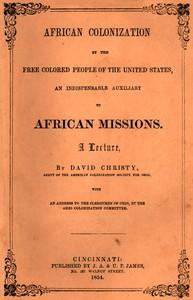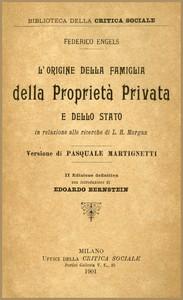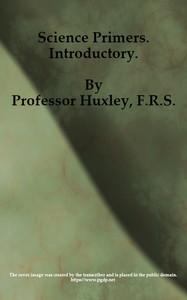Read this ebook for free! No credit card needed, absolutely nothing to pay.
Words: 33079 in 9 pages
This is an ebook sharing website. You can read the uploaded ebooks for free here. No credit cards needed, nothing to pay. If you want to own a digital copy of the ebook, or want to read offline with your favorite ebook-reader, then you can choose to buy and download the ebook.
PART. SECT.
PAGE
LIVING BODIES.
SCIENCE PRIMERS.
Thus we believe that everything is the effect of something which preceded it as its cause, and that this cause is the effect of something else, and so on, through a chain of causes and effects which goes back as far as we choose to follow it. Anything is said to be explained as soon as we have discovered its cause, or the reason why it exists; the explanation is fuller, if we can find out the cause of that cause; and the further we can trace the chain of causes and effects, the more satisfactory is the explanation. But no explanation of anything can be complete, because human knowledge, at its best, goes but a very little way back towards the beginning of things.
Artificial things are, in fact, all produced by the action of that part of nature which we call mankind, upon the rest.
We talk of "making" a box, and rightly enough, if we mean only that we have shaped the pieces of wood and nailed them together; but the wood is a natural object and so is the iron of the nails. A watch is "made" of the natural objects gold and other metals, sand, soda, rubies, brought together, and shaped in various ways; a coat is "made" of the natural object, wool; and a frock of the natural objects, cotton or silk. Moreover, the men who make all these things are natural objects.
Carpenters, builders, shoemakers, and all other artisans and artists, are persons who have learned so much of the powers and properties of certain natural objects, and of the chain of causes and effects in nature, as enables them to shape and put together those natural objects, so as to make them useful to man.
A carpenter could not, as we say, "make" a chair unless he knew something of the properties and powers of wood; a blacksmith could not "make" a horseshoe unless he knew that it is a property of iron to become soft and easily hammered into shape when it is made red-hot; a brickmaker must know many of the properties of clay; and a plumber could not do his work unless he knew that lead has the properties of softness and flexibility, and that a moderate heat causes it to melt.
So that the practice of every art implies a certain knowledge of natural causes and effects; and the improvement of the arts depends upon our learning more and more of the properties and powers of natural objects, and discovering how to turn the properties and the powers of things and the connections of cause and effect among them to our own advantage.
Among natural objects, as we have seen, there are some that we can get hold of and turn to account. But all the greatest things in nature and the links of cause and effect which connect them, are utterly beyond our reach. The sun rises and sets; the moon and the stars move through the sky; fine weather and storms, cold and heat, alternate. The sea changes from violent disturbance to glassy calm, as the winds sweep over it with varying strength or die away; innumerable plants and animals come in being and vanish again, without our being able to exert the slightest influence on the majestic procession of the series of great natural events. Hurricanes ravage one spot; earthquakes destroy another; volcanic eruptions lay waste a third. A fine season scatters wealth and abundance here, and a long drought brings pestilence and famine there. In all such cases, the direct influence of man avails him nothing; and, so long as he is ignorant, he is the mere sport of the greater powers of nature.
At this present moment, as I look out of my window, it is raining and blowing hard, and the branches of the trees are waving wildly to and fro. It may be that a man has taken shelter under one of these trees; perhaps, if a stronger gust than usual comes, a branch will break, fall upon the man, and seriously hurt him. If that happens it will be called an "accident," and the man will perhaps say that by "chance" he went out, and then "chanced" to take refuge under the tree, and so the "accident" happened. But there is neither chance nor accident in the matter. The storm is the effect of causes operating upon the atmosphere, perhaps hundreds of miles away; every vibration of a leaf is the consequence of the mechanical force of the wind acting on the surface exposed to it; if the bough breaks, it will do so in consequence of the relation between its strength and the force of the wind; if it falls upon the man it will do so in consequence of the action of other definite natural causes; and the position of the man under it is only the last term in a series of causes and effects, which have followed one another in natural order, from that cause, the effect of which was his setting out, to that the effect of which was his stepping under the tree.
Free books android app tbrJar TBR JAR Read Free books online gutenberg
More posts by @FreeBooks

: African Colonization by the Free Colored People of the United States an Indispensable Auxiliary to African Missions. A Lecture by Christy David - African Americans Colonization Africa; Missions Africa


: L'origine della Famiglia della Proprietà privata e dello Stato in relazione alle ricerche di L. H. Morgan by Engels Friedrich Martignetti Pasquale Translator - Primitive societies; State The; Families History; Property History; Morgan Lewis Henry 1818-188








